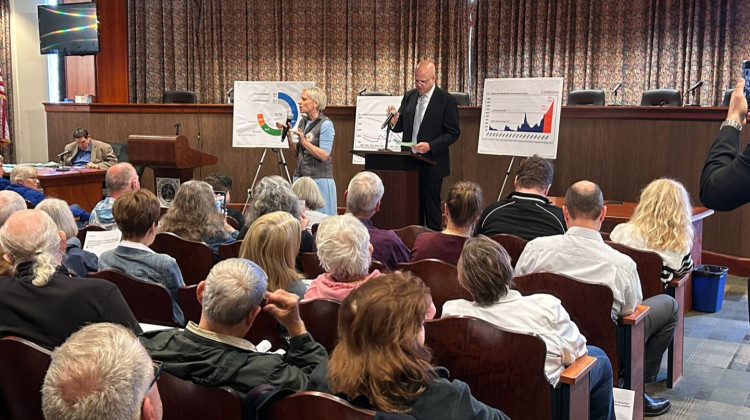
A 2018 lawsuit challenged almost all of Indiana's abortion laws, crafted by state legislators at the Statehouse over the last few decades.
Brandon Smith/IPB NewsUpdated Oct. 27 at 3:10 p.m.
A federal judge late Friday upheld several of Indiana’s abortion regulations on some grounds – while the ultimate fate of the state's restrictions is still undecided.
Whole Woman’s Health Alliance, an abortion provider with a clinic in South Bend, sued the state in 2018, trying to eliminate almost all of Indiana’s abortion laws. The provider used a three-pronged attack: it argued the statutes violate the 14th Amendment's Due Process, the 14th Amendment's Equal Protection Clause and the First Amendment.
Federal Judge Sarah Evans Barker Barker used Supreme Court precedents on abortion as a measuring stick to evaluation more than a dozen individual abortion regulations in her decision Oct. 9. On some, she ruled in the state’s favor. But Barker said most provisions of Indiana abortion law need further investigation and court proceedings.
The case as a whole is far from over, both through further arguments at the district court level and likely in federal appeals court.
The state abortion laws Barker upheld under the Due Process Clause:
- a requirement that all Indiana abortion clinics must be licensed by the state
- requirements that mandate doctors who perform abortions must report information to the state about their patients (such as the patient's maternal history and date of last menses, the age and gender of the fetus and whether the patient was seeking an abortion as a result of abuse, coercion, harassment, or trafficking)
- a requirement that doctors who perform abortions must have admitting privileges at a hospital in the county where the abortion occurs (or an adjacent county) or that those doctors must have a written agreement with another physician with admitting privileges at such a hospital
- a requirement banning doctors from administering abortion-inducing medications past nine weeks of pregnancy unless the Food and Drug Administration says they can
- requirements related to the physical buildings that house abortion clinics
- a requirement that doctors must inform people seeking abortions about the options for disposing of fetal tissue
- information in a brochure informing patients of the state's Perinatal Hospice options that states risks associated with abortion increase after 21 weeks
- a requirement that doctors must perform an ultrasound at least 18 hours before the abortion procedure
- a requirement that a person must wait at least 18 hours between giving informed consent and undergoing the abortion procedure.
- a requirement that anyone under the age of 18 must get parental consent before getting an abortion (or go to a court to bypass that consent requirement)
The state abortion laws Barker said will require further arguments under the Due Process Clause:
- a requirement that only doctors (and not, for instance, nurse practitioners) can perform abortions
- a requirement that second trimester abortions can only take place in hospitals or ambulatory surgical centers
- a requirement that the mandated patient examination at least 18 hours before an abortion must be done in-person
- a requirement that the mandated informed consent at least 18 hours before an abortion must be done in-person
- a ban on providing abortion care via telemedicine
- a requirement that doctors tell patients a fetus can feel pain
- a requirement that doctors tell patients that "human physical life begins when a human ovum is fertilized by a human sperm"
- information in a brochure informing patients of the state's Perinatal Hospice options that states abortion is associated with worse mental health outcomes than experienced in carrying a pregnancy to term
- provisions that impose criminal penalties for violating many abortion regulations
Barker also sided with the state on two narrow provisions of the law that Whole Woman's Health challenged under the Equal Protection Clause and the First Amendment.
But almost all of Indiana's abortion regulations will undergo further constitutional scrutiny in court.
CORRECTION: A previous version of this story said the judge upheld several laws as constitutional. That was incorrect. Her ruling only sided with the state on several Due Process claims. Almost all Equal Protection claims – in addition to some Due Process claims – will advance.
Contact reporter Brandon at bsmith@ipbs.org or follow him on Twitter at @brandonjsmith5.
 DONATE
DONATE






 Support WFYI. We can't do it without you.
Support WFYI. We can't do it without you.